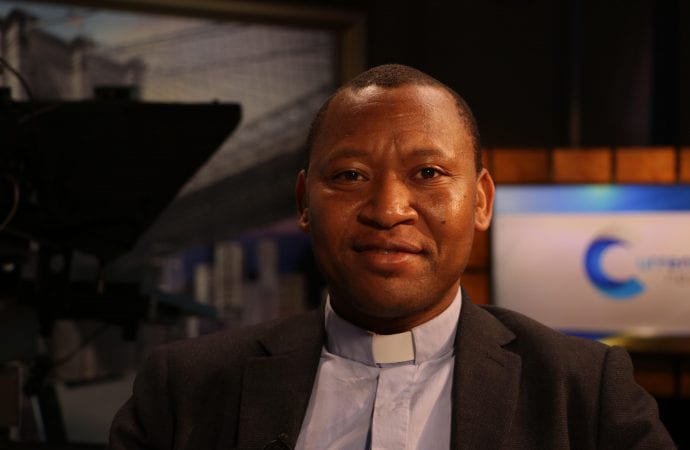
By Christopher White, National Correspondent
NEW YORK – Western nations have an obligation to defend Nigerian Christians being slaughtered by Boko Haram since many are being killed because the militant group views them as being “allies of the West,” says one Catholic priests from the African country.
According to Father Joseph Bature Fidelis of the Diocese of Maiduguri, “the rise of militant groups is growing very high and that should be the concern of Western leaders to say ‘we need to step in there and we need to help these people.’”
“It is very clearly stated by Boko Haram that they are persecuting Christians because they fear Christians are allies of the West,” he told The Tablet during a visit to the U.S. sponsored by the international papal charity Aid to the Church in Need, which supports suffering Christians around the globe.
While Fr. Bature said that Christians in Nigeria aren’t necessarily allies “in the strictest sense,” Boko Haram has targeted them for their support of Western civilization and Western education.
“If we are being persecuted for being allies, they should defend us,” he said of the duty of Western nations to proactively respond to the dire situation where an estimated 1,000 Nigerians have been killed for their faith last year alone and more than 6,000 have been suffered death since 2015.
Fr. Bature is one of just over 40 active priests of the large diocese which covers nearly three states within the country – one in which Catholics are a tiny minority currently estimated at 210,000, following the displacement of over 100,000 who fled the region’s violence.
“The numbers keep declining,” said Fr. Bature, where many Christians have been displaced into neighboring Cameroon.
Surrounding the tiny population of Christians are 4.5 million Muslims, some of whom have been radicalized by extremist groups within the country.
“Being situated in the midst of Muslims defines, the life, the faith and the vocations of everything they do daily,” Fr. Bature said of the region’s Catholics. “It is not an easy thing. It is a challenging responsibility, but that is what we want to do – to bring the light of Christ.”
The 39-year-old priest who runs is the director of the Justice, Development and Peace Commission in the diocese says that unless Nigeria’s government promotes the rule of law, which includes the right to religious freedom, the situation in the country will continue to decline.
“When mass number people have been killed…and the government is not swift in responding, what conclusion are you supposed to draw?” Fr. Bature said of the leadership of President Muhammadu Buhari, a Muslim, who has faced criticism for not being swift to condemn action and to actively take measure to protect the country’s Christians.
“The swiftness is what gives the government credibility, so if the government is not providing security, is not defending the people, then I think they are failing in their responsibility,” he added.
While Buhari has promised to stabilize the situation, Fr. Bature says that many people throughout the country have “held on to his words” but are still waiting on things to improve.
“I think this government is very slow in doing that. It’s not that they are not doing it at all but the responses are very slow and sometimes uncoordinated,” he said.
“Yes, we may be few in the midst of a Muslim region, but don’t we have the right to practice our own faith?” Fr. Bature asked.
Along with the thousands who have been killed, thousands more have been raped; others are firsthand witnesses to the slaughter of their loved ones.
Recently, Aid to the Church in Need provided the diocese with a grant of $325,000 to build a trauma and resource center for displaced persons who have suffered violence at the hands of Boko Haram. The center will provide both individual and group support to the thousands of Catholics within the diocese who are attempting to recover from trauma and tragedy, even as it continues around them.
Fr. Bature believes that if the government will enforce a rule of law, then Catholics and Muslims alike will be able to enjoy a new stability that will benefit the entire nation.
“It is not just even Christians,” he said. “Everyone has a right to live and practice his or her own faith.”
“We are advocating for religious freedom because it is the right of every person, Christian or Muslim to practice their faith and live in peace with their neighbors. We should respect the diversity of the Nigerian country,” he continued. “We have diverse ethnic groups, diverse religious affiliations and creeds. People should respect that.”
As for outside leaders, he wants Western nations to increase the pressure on Nigeria to send a message that the world is watching.
“They have a big role to play in helping people – not just in my country, but in Africa, citing Burkina Faso, Mali, Central African Republic, and Cameroon,” he added. “We call on them, we appeal to them, we beg them to do something for our people.”
As for what this looks like concretely, he said that countries, including the United States, should use their diplomatic channels to pressure the country and to use trade agreements or conditions on aid to demand stability and peace.
To that point, he applauded President Donald Trump for telling the Nigerian president that he needed to defend his country’s Christians, but noted it will require more than words to change the situation on the ground.
“We look forward to seeing more proactive solutions,” he said.
